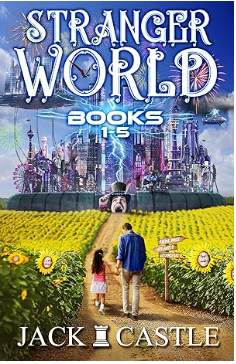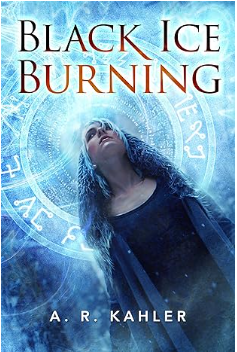With Christmas on the way, I'll tempt you with a list of my favorite finds, updated to include 2023:
1. Jack Castle's Stranger World series. In the future, the world is taken over by full-immersion theme
parks. More people live, work, and play in Henry Stranger Worlds than those who don't. Then comes b-day when the attractions take over the dystopian theme park and humans become the amusement. Enter George Stapleton, a pararescue pilot shot down in Afghanistan who wakes up in this sinister upside down world and must rescue his daughter Maddie from the evil clutches of Corporate and a quite mad Lamppost Man. You can purchase the books individually or get five of them in one omnibus edition. I have it on good authority, this series will continue.
2. Susan Kaye Quinn: Third Daughter, Second Daughter, and First Daughter.
A bollywood steampunk trilogy, how is that for a combination? I enjoyed the world-building, interesting plot lines, and delicious descriptions.
I enjoyed Quinn's other series: The Mindjack Trilogy, a dystopian YA set in Chicago. In a world where everyone can read minds, how do you fight back?
And the Debt Collector serial: Time is a commodity, have you earned yours or is it time to collect?
A second Debt Collector series will be completed December 15.
http://www.amazon.com/Susan-Kaye-Quinn/e/B003TTJRXU/ref=sr_tc_2_0?qid=1412965562&sr=8-2-ent
3. Brenna Yovanoff: The Replacement, The Space Between, Paper Valentine, and Fiendish. Her stories are modern-day fables reminiscent of the Brothers Grimm. The plots are slight, but her glorious use of language and description makes up for them. Paper Valentine was my least favorite. The other three I could not put down.
http://www.amazon.com/Brenna-Yovanoff/e/B003VKZBT6/ref=sr_tc_2_0?qid=1412965242&sr=8-2-ent
4. A. R. Kahler: The Immortal Circus Trilogy
This circus performer has terrific world-building and delightful wordsmithery. Queen Mab runs a circus and it is a hell of a show. This is a trilogy I will never forget.
The sequel to Immortal Circus is the Pale Queen Trilogy. by A. R. Kahler
As the royal assassin, Claire is used to moving between the mortal world and the Winter Kingdom. When the queen commands her to kill, Claire does the job and doesn’t ask questions. Her deadly skills and loyalty are soon tested when Claire is sent to the Immortal Circus, one of the many places where “Dream” is harvested from the imaginings of mortals, and someone is causing it to mysteriously disappear. Claire’s job is to find the culprit before the Winter Kingdom’s supply of Dream is depleted enough to threaten its very survival. But when she meets Roxie, a beautiful mortal singer with a strange link to the Dream thieves, Claire quickly recognizes an odd and unexplained connection that may cloud her judgment. As each new clue unveils another secret, Claire finds herself confronting the riddle of her own buried past—and a dangerous illusion that, as part of the Immortal Circus, is just another act in the show.
Pale Queen Rising, Black Ice Burning, and Cold Dream Dawning will keep you reading well past your bedtime.
The Rune Binder Chronicles by A. R. Kahler
The Ravenborn Duology: Shades of Darkness and Echoes of Memory by A. R. Kahler
If you've discovered an exciting new voice, let me know in the comments.
A bollywood steampunk trilogy, how is that for a combination? I enjoyed the world-building, interesting plot lines, and delicious descriptions.
And the Debt Collector serial: Time is a commodity, have you earned yours or is it time to collect?
A second Debt Collector series will be completed December 15.
http://www.amazon.com/Susan-Kaye-Quinn/e/B003TTJRXU/ref=sr_tc_2_0?qid=1412965562&sr=8-2-ent
3. Brenna Yovanoff: The Replacement, The Space Between, Paper Valentine, and Fiendish. Her stories are modern-day fables reminiscent of the Brothers Grimm. The plots are slight, but her glorious use of language and description makes up for them. Paper Valentine was my least favorite. The other three I could not put down.
http://www.amazon.com/Brenna-Yovanoff/e/B003VKZBT6/ref=sr_tc_2_0?qid=1412965242&sr=8-2-ent
4. A. R. Kahler: The Immortal Circus Trilogy
This circus performer has terrific world-building and delightful wordsmithery. Queen Mab runs a circus and it is a hell of a show. This is a trilogy I will never forget.
The sequel to Immortal Circus is the Pale Queen Trilogy. by A. R. Kahler
As the royal assassin, Claire is used to moving between the mortal world and the Winter Kingdom. When the queen commands her to kill, Claire does the job and doesn’t ask questions. Her deadly skills and loyalty are soon tested when Claire is sent to the Immortal Circus, one of the many places where “Dream” is harvested from the imaginings of mortals, and someone is causing it to mysteriously disappear. Claire’s job is to find the culprit before the Winter Kingdom’s supply of Dream is depleted enough to threaten its very survival. But when she meets Roxie, a beautiful mortal singer with a strange link to the Dream thieves, Claire quickly recognizes an odd and unexplained connection that may cloud her judgment. As each new clue unveils another secret, Claire finds herself confronting the riddle of her own buried past—and a dangerous illusion that, as part of the Immortal Circus, is just another act in the show.
Pale Queen Rising, Black Ice Burning, and Cold Dream Dawning will keep you reading well past your bedtime.
The Rune Binder Chronicles by A. R. Kahler
When magic returned to the world, it could have saved humanity, but greed and thirst for power caused mankind’s downfall instead. Now once-human monsters called Howls prowl abandoned streets, their hunger guided by corrupt necromancers and the all-powerful Kin. Only Hunters have the power to fight back in the unending war, using the same magic that ended civilization in the first place.
But they are losing.
Tenn is a Hunter, resigned to fight even though hope is nearly lost. When he is singled out by a seductive Kin named Tom‡s and the enigmatic Hunter Jarrett, Tenn realizes he’s become a pawn in a bigger game. One that could turn the tides of war. But if his mutinous magic and wayward heart get in the way, his power might not be used in favor of mankind.
If Tenn fails to play his part, it could cost him his friends, his life…and the entire world.
The Ravenborn Duology: Shades of Darkness and Echoes of Memory by A. R. Kahler
When Kaira Winters decided to go to Islington—a boarding school deep in the woods of Michigan—she thought she could finally get away from everything she has tried so hard to forget, including some things from her past that she refuses to believe ever actually happened.
Everything seemed great until the bodies of murdered students started appearing all over campus. The victims seem to have been killed in some sort of ritual sacrifice. And even worse, Kaira’s dreams are giving her clues to the killer’s identity.
Though she tries to resist, Kaira quickly realizes that she is the only one who can stop the violence, but to do so she must come to terms with her past. She’s going to have to listen to the voice that is buried deep within her…the one that claims to have unimaginable power…the one that claims to be an actual goddess.
But even if Kaira can harness the power within her, will it be enough to stop the darkness that has fallen over her school? And if it is strong enough, then what’s to stop the goddess from wreaking her own havoc once she’s released?
If you've discovered an exciting new voice, let me know in the comments.





.jpg)
.jpg)








